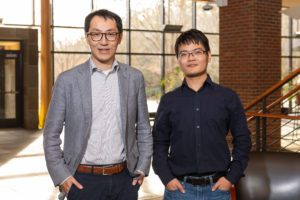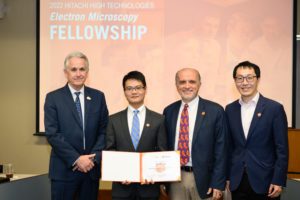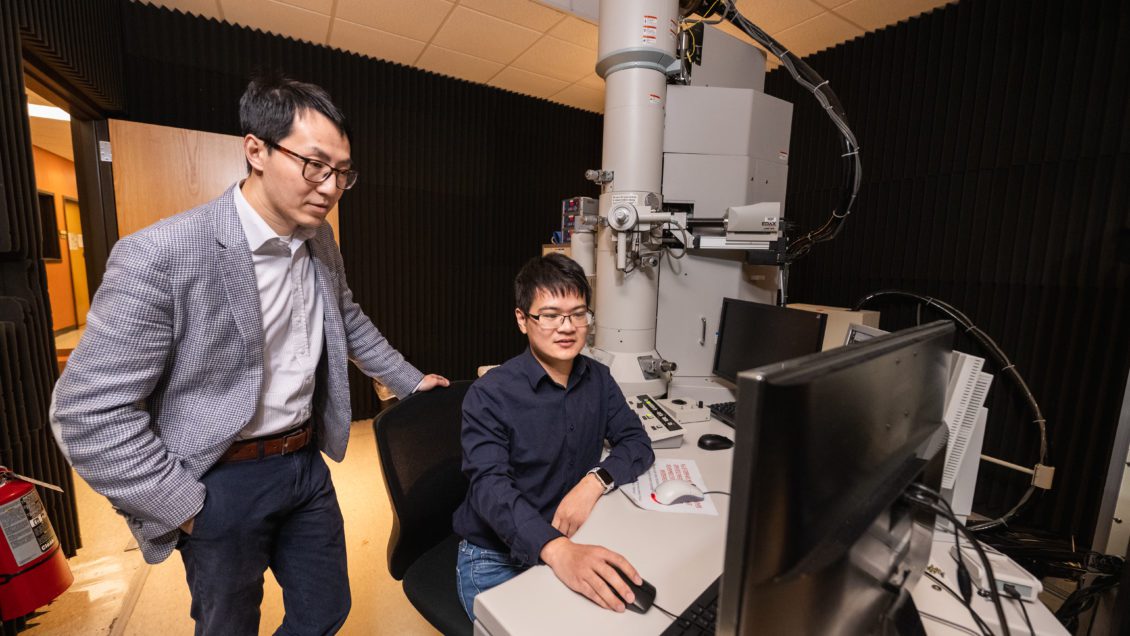Clemson University Ph.D. student Zehua Jin has received the 2022-2023 Hitachi High-Tech Electron Microscopy Fellowship to further his research on the development of advanced catalytic materials to convert carbon dioxide into value-added chemicals.
The research aims to support the mitigation of greenhouse gas emissions and production of renewable fuel.
The $25,000 Hitachi Fellowship supports Jin’s use of highly advanced equipment at the Clemson University Electron Microscopy Facility, where he is studying electrocatalytic carbon dioxide reduction. Electrocatalytic reduction is a process by which catalysts are added to solids or liquids to induce beneficial chemical reactions. In this case, Jin would selectivity disperse platinum-group metals (PGM) as isolated atoms on copper nanoparticles.
The idea is like adding sugar to coffee, said Ming Yang, assistant professor of chemical and biomolecular engineering and Jin’s faculty advisor. PGM is the sugar. The copper is the coffee.
“Sugar easily dissolves to sweeten our coffee, but the exercise is challenging for the design and development of catalytic materials that enable net-zero carbon emissions,” he said.

Too much PGM could lead to the formation of extended PGM crystal surfaces, just like sugar crystals, Yang said. Such structures will adversely suppress the targeted carbon dioxide reduction but catalyze side reactions to produce hydrogen instead. Jin’s research focuses on engineering the PGM as atomically dispersed species on shape-controlled copper surfaces to accelerate the formation of methane or ethylene from carbon dioxide.
Electron microscopy allows Jin to analyze these interactions and fine-tune the catalysts to achieve the desired results.
“I believe seeing is believing, which echoes the beauty of microscopic studies,” Jin said. “I expect to guide an increasing amount undergraduate researchers in this NASA sponsored project through engaging image illustrations made possible by the Hitachi Fellowship.”
Jin has published nine peer-reviewed research papers, including four as first author. He has co-authored three book chapters and been named on two patents. He began his studies at Clemson in 2020 after graduating from Inner Mongolia University in China, where he also served as a research assistant. Additionally, Jin serves as a student research mentor with Clemson’s Creative Inquiry program, where multiple undergraduate researchers Jin guided had received awards from the university and external sponsors.
Hitachi High-Tech America established the fellowship in 2014 to support a graduate student using the Clemson University Electron Microscopy Facility to conduct research as part of their doctoral studies. Jin is the ninth recipient.
“Hitachi is proud to support the research accomplishments of Zehua Chin and his important work in shape-controlled single-atom catalysts though the Hitachi Electron microscopes located at Clemson’s cutting-edge microscopy facility,” said Lorena Ferry, vice president and general manager, Hitachi High-Tech America. “His extensive research with advanced catalytic materials and the development of novel electrochemical cells has been made possible through his dedication to his work, and access to SU9000 CFE-SEM/STEM and HT7830 TEM. Studies into how single-atom alloy reacts with doped platinum group metals, derived from Zehua’s research can contribute significantly to the scientific community. We are pleased to celebrate Zehua Chin and his accomplishments.”

Hitachi has been instrumental in both the development of the Clemson University Electron Microscopy Facility in the mid-1990s, as well as its steady growth to become one of the nation’s premier academic electron microscopy facilities. The facility added several new Hitachi electron microscopes in recent years, for example, that are among the global company’s most advanced machines. Additionally, Hitachi has a staff member on site to ensure the advanced equipment is operating in top condition.
“Industry in South Carolina and throughout the Southeast utilize our Electron Microscopy Facility to advance innovation for their businesses, and faculty from numerous disciplines and even other institutions use the lab to advance science,” said Tanju Karanfil, Clemson vice president for research. “Our students, meanwhile, have an opportunity to train on the latest technology available, making them highly desirable in the job market after graduating, so the lab is a great benefit to local economic and workforce development.”
Daniel Noneaker, associate dean for research in the College of Engineering, Computing and Applied Sciences, thanked Hitachi High-Tech America for its continued support of the college’s students.
“Hitachi High-Tech America is an important partner in the college’s research enterprise,” Noneaker said. “High-powered, electron microscopes provide our researchers with unique capabilities and help us recruit and retain the best and brightest students and faculty. I congratulate Zehua on winning this year’s fellowship.”
Congratulations also came from the college’s dean, Anand Gramopadhye.
“The Hitachi High-Tech America Fellowship is among the innovative ways we work with industry to provide financial support to our students so they can maintain their focus on research and learning,” Gramopadhye said. “I thank Hitachi High-Tech America for its many years of support and congratulate Zehua on his well-deserved fellowship.”
Get in touch and we will connect you with the author or another expert.
Or email us at news@clemson.edu

